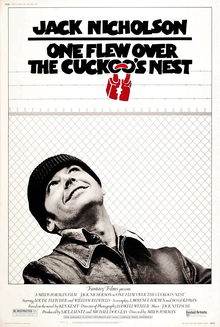
This is of course another famous film based on an equally famous novel and it was directed by Miloš Forman who everyone surely knows due to Amadeus. Plus it stars Jack Nicholson in a film set in a mental institution. What could be more perfect, right? It turns out that the premise is actually that he plays the sole sane man in an asylum and that is even more awesome.
Randle McMurphy, convicted of statutory rape, arrives in a mental institution for evaluation after he fares badly in a conventional prison. The ward is run by Nurse Ratched who brooks no challenges to her authority and hosts male patients with diverse ailments ranging from the stuttering Billy Bibbit who has problems interacting with women to the physically imposing Native American Chief who is thought to be deaf and mute. McMurphy befriends the other inmates, at least those who are coherent, and tries to liven things up. He tries to persuade Ratched to allow them to watch the World Series baseball games on television and organizes card games where they gamble for cigarettes. Ratched frustrates him at every turn however citing the rules and the welfare of the other patients though she seems to more interested in establishing order than helping any of them actually get well. After having had enough, McMurphy escapes, steals the hospital bus and uses it to take the other inmates on an ad hoc fishing trip.
As someone who is scientifically literate and appreciative of the efforts of real doctors and nurses, I am uncomfortable with the underlying message here that mental health institutions are harmful and that they are staffed by evil nurses and doctors. It is also wrong to think of them as prisons from which inmates should aspire to escape from and that getting up to all manner of excitable antics is a good cure for mental illnesses. However as my wife notes this film is probably best thought of as a metaphorical battle between a repressive, authoritarian regime and a rebellious, free-spirited agent of chaos. We can also blame its depiction of asylums on the bad old days when electroshock therapy is permissible as a form of punishment and lobotomies were common. It makes it a lot more palatable if we think of it as not being a realistic scenario and it’s hard to imagine a film like this being made today.
These concerns aside, this is indeed a fantastic film with a particular delight being the excellent performances by well known actors much younger than you’ve probably ever seen them. It has a large cast and yet every character is distinctive and memorable. I love that McMurphy doesn’t always get his way and it’s more important that he at least tries. Louise Fletcher’s performance as the antagonist is great as well who rules the ward with an iron fist without ever needing to raise her voice. It’s the ultimate example of control by being passive-aggressive. I also like how Forman is a good enough director that he balances out the high energy performances with a single, long shot of nothing but Nicholson’s face near the end as that alone is enough to tell the story. The final confrontation is horrible but so cathartic and satisfying.
I note that this film is similar in many respects to Cool Hand Luke even though both the authority and the rebel are represented in each film by very different figures appropriate to their respective eras. Once again, I do dislike its outmoded portrayal of mental hospitals but this is otherwise a great film.
One thought on “One Flew Over the Cuckoo’s Nest (1975)”